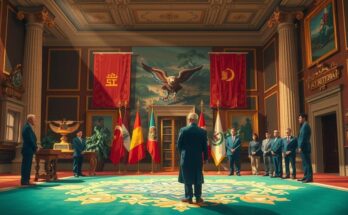Ugandan lawmakers have arrived in Nigeria to study the constituency project system, focusing on the Constituency Development Fund (CDF). The workshop aims to enhance understanding of effective fund utilization for better representation. Emphasis is placed on the necessity of strong relations between legislators and constituents to address community needs effectively, with discussions also highlighting the role of parliamentarians in governance across Africa.
Members of the Ugandan Parliament’s Budget Committee have traveled to Nigeria to learn about the country’s constituency project system. At a workshop hosted by the National Institute for Legislative and Democratic Studies (NILDS), Mr. Philip Opolot, the committee chairman, expressed their objective to understand Nigeria’s Constituency Development Fund (CDF). The workshop was centered around the theme: ‘Maximising Impact through Effective Utilisation of Constituency Development Fund for Better Quality Representation at Parliament.’
Mr. Opolot noted that in Uganda, all funds currently reside with the executive branch, which administers interventions as deemed necessary. He mentioned ongoing discussions regarding the potential for lawmakers to manage the CDF, considering their greater familiarity with their constituencies. The workshop aims to provide insights into these operations.
In his address, Prof. Abubakar Sulaiman, Director-General of NILDS, emphasized the necessity for robust constituency relations between legislators and their constituents to enhance the effectiveness of the CDF. He argued that in contemporary democracy, citizens expect frequent communication with their elected officials, who can assist in addressing collective concerns.
Prof. Sulaiman highlighted the advantages of constituency relations, noting that it allows lawmakers to gather policy inputs from constituents and provides citizens with a platform to present their specific needs. He illustrated how CDF plays a pivotal role in grassroots development, enabling legislators to finance community-oriented projects effectively and transparently.
The Ugandan Deputy High Commissioner to Nigeria, Ambassador Philip Odidah, commended the leadership of Nigeria’s National Assembly for their commitment to bolstering legislative institutions throughout Africa. He emphasized the vital role of parliamentarians in representing the people, passing legislation, and ensuring that governance aligns with the desires of their constituents.
Ambassador Odidah viewed the capacity-building initiative as an excellent opportunity for Ugandan parliamentarians to gain essential governance tools and improve democratic engagement. He urged participants to actively engage in the exchange of ideas and experiences to bolster inter-parliamentary collaboration between Uganda and Nigeria.
In summary, the workshop conducted in Nigeria serves as a foundational learning experience for Ugandan lawmakers as they explore the country’s successful constituency project system. It underscores the importance of effective constituency relations and the management of development funds. The initiative reflects a commitment to enhancing legislative practices and fostering cooperation between Uganda and Nigeria.
Original Source: nannews.ng




